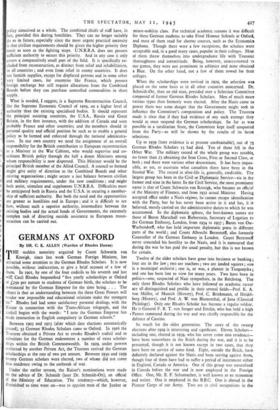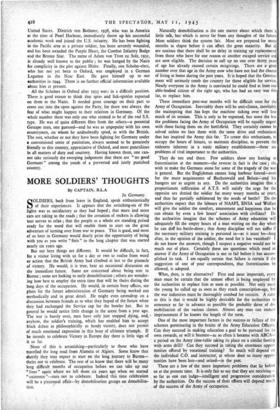GERMANS AT OXFORD
• By DR. C. K. ALLEN (Warden of Rhodes Douse)
Between 1903 and 1913 (after which date elections automatically ceased), 55 German Rhodes Scholars came to Oxford. In 1916 the Trustees obtained a Private Act to revoke Rhodes's codicil and to substitute for the German endowment a number of extra scholar- ships within the British Commonwealth. In 1929, under powers cunferred by another Private Act, the Trustees revived the German scholarships at the rate of two per annum. Between 1930 and 1939 twenty German scholars were elected, two of whom did not come Into residence owing to the outbreak of war.
Under the earlier system, the Kaiser's nominations were made on the advice of Dr. Schmidt (later Dr. Schmidt-Ott), an official of the Ministry of Education. The tendency—which, however, diminished as time went on—was to appoint men of the Junker or
minor-nobility class. For technical academic reasons it was difficult for these German students to take Final Honour Schools at Oxford, and most of them read for shorter courses, such as the Economic Diploma. Though there were a few exceptions, the scholars were acceptable and, in a good many cases, popular in their colleges. Most of them threw themselves into undergraduate life with Teutonic thoroughness and correctitude. Being, however, unaccustomed to our games, they were not prominent in athletics and none obtained a Blue. On the other hand, not a few of them rowed for their colleges.
When the scholarships were revived in 1929, the selection was placed on the same basis as in all other countries concerned. Dr. Schmidt-Ott, then an old man, presided over a Selection Committee composed of former German Rhodes Scholars. Men of much more various types than formerly were elected. After the Nazis came to power there was some danger that the Government might seek to influence the Committee's composition and policy. The Trustees made it clear that if they had evidence of any such attempt they would at once suspend the German scholarships. So far as was possible in a totalitarian State, the Committee kept itself unspotted from the Party—as will be shown by the results of its latest selections.
Up to 1939 (later evidence is at present unobtainable), out of 75 German Rhodes Scholars 15 had died. Ten of these fell in the Other War. The military record of the whole group was notable, no fewer than 23 obtaining the Iron Cross, First or Second Class, or both ; and there were various other decorations. It has been impos- sible, as yet, to ascertain what casualties there have been in the Second War. The record in after-life is, generally, creditable. The largest group has been in the Civil or Diplomatic Service—six in the former and nine in the latter. In tht Civil Service, the most prominent name is that of Count Schwerin von Krosigk, who became an official of the Ministry of Finance, and from 1932 actual Minister. Having accepted office under a Nazis regime, he cannot escape identification with the Party, but he has never been active in it and has, it is believed, merely carried on the administrative duties to which he was accustomed. In the diplomatic sphere, the best-known names are those of Baron Marschall von Bieberstein, Secretary of Legation to the German Embassy, London, from 1934 to 1937 ; Baron von Ow- Wachendorff, who has held important diplomatic posts in different parts of the world ; and Count Albrecht Bernstorff, also formerly Counsellor of the German Embassy in London. Count Bernstorff never concealed his hostility to the Nazis, and it is rumoured that during the war he has paid the usual penalty, but this is not known for certain.
Twelve of the older scholars have gone into business or banking ; four arc in the law ; two are teachers ; two are landed squires ; one is a municipal archivist ; one is, or was, a planter in Tanganyika ; and one has been lost to view for many years. Two have been in politics—one, suspected of Nazi sympathies, in the Reichstag. The only three Rhodes Scholars who have followed an academic career are all distinguished and prolific in their several fields—Prof. K. A. von Muller, of Munich (History), Prof. C. Brinkmann, of Heidel- berg (History), and Prof. A. W. von Blumenthal, of Jena (Classical Philology). Only one Rhodes Scholar has become a regular soldier. He is General F. R. T. von Senger and Ettelin, who has held a high • Panzer command during the war and was chiefly responsible for the defence of Cassino.
So much for the older generation. The story of the twenty elections after 1929 is interesting and significant. Eleven Scholars— including one, elected in 1939, who has never come into residence— have been somewhere in the Reich during the war, and it is to be presumed, though it is not known except in two cases, that they have been on service of some kind. Eight, outside the Reich, have definitely declared against the Nazis and been serving against them, though four of them have had to suffer a period of internment either in England, Canada or America. One of this group was naturalised in Canada before the war and is now employed in the Foreign Office. One, Mr. E. F. Schumacher, is well known as an economist and writer. One is employed in the B.B.C. One is abroad in the Pioneer Corps of our Army. Two are in civil occupations in the United States. Dietrich von Bothmer, 1938, who was in America at the time of Pearl Harbour, immediately threw up his successful academic work and joined the U.S. infantry. He has been fighting in the Pacific area as a private soldier, has been severely wounded, and has been awarded the Purple Heart, the Combat Infantry Badge and the Bronze Star. The name of Adam von Trott zu Solz, 193r, is already well known to the public ; he was hanged by the Nazis for complicity in the plot against Hitler. Finally, one Scholar-elect, who has not yet been to Oxford, was employed in a German Legation in the Near East. He gave himself up to our authorities in 1944. There is no further official information available about him at present.
All the Scholars in Oxford after 1933 were in a difficult position. There is good reason to think that spies and lick-spirtles reported on them to the Nazis. It needed great courage on their part to come out into the open against the Party, for there was always the fear of what might happen to their relatives in Germany. Of the whole number there was only one who seemed to be of the real S.S. type. He was of quite different fibre from the others—a potential Gestapo man, one guessed—and he was as unpopular with his own countrymen, on whom he undoubtedly spied, as with the British. The rest, whether or not they have been fighting for Germany under a conventional sense of patriotism, always seemed to be genuinely friendly to this country, appreciative of Oxford, and most punctilious in all matters of duty and courtesy. Having known them, one can- not take seriously the sweeping judgement that there are " no good Germans " among the youth of a perverted and justly punished country.























 Previous page
Previous page